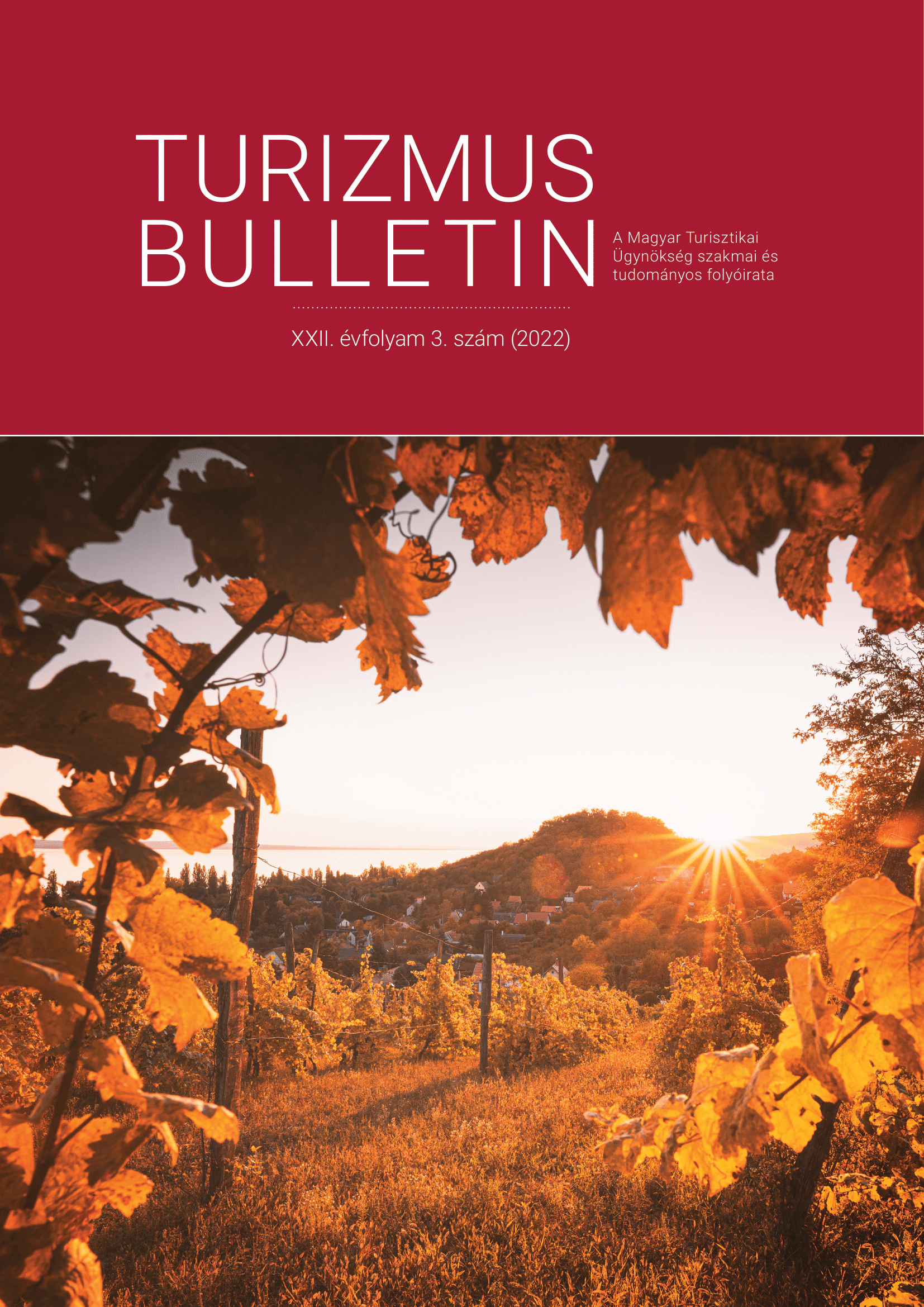The role of academic service quality and acculturation in Hungarian educational tourism
DOI:
https://doi.org/10.14267/TURBULL.2022v22n3.3Keywords:
educational tourism, international students, academic service quality, acculturationAbstract
Over the last decade Hungary has become a significant destination for educational tourism in Central Europe. However, in order to maintain that growth, one should keep in mind the needs of international students. This research investigated the most important academic service quality factors and the
extent to which the acculturation strategy of international students influenced the academic service quality during the 2020 pandemic. The research was conducted with 20 international students and the in-depth interviews were subject to thematic content analysis. The professional knowledge, the
hands-on working experience, helpfulness of educators and the speed of transitioning into online education are key academic service quality factors for international students. Students striving for cultural integration were largely more satisfied with the academic service quality than those who decided to choose the assimilation acculturation strategy, or to be separated from their fellow students.
References
ABDULLAH, F. (2006): Measuring service quality in higher education: HEdPERF versus SERVPERF. Marketing Intelligence and Planning. 24(1). pp. 31–47. https://doi.org/10.1108/02634500610641543
ALI, F. – ZHOU, Y. – HUSSAIN, K. – NAIR, P. K. – RAGAVAN, N. A. (2016): Does higher education service quality effect student satisfaction, image and loyalty? A study of international students in Malaysian public universities. Quality Assurance in Education. 24(1). pp. 70–94. https://doi.org/10.1108/QAE-02-2014-0008
ARRIVABENE, L. – VIEIRA, P. R. C. – MATTOSO, C. (2019): Impact of Service Quality, Satisfaction and Corporate Image on Loyalty: A Study of a Publicly Traded for-Profit University. Services Marketing Quarterly. 40(3). pp. 1–17. https://doi.org/10.1080/15332969.2019.1630174
ASGARI, M. – BORZOOEI, M. (2014): Effects of service quality and price on satisfaction and the consequent learning outcomes of international students. International Journal of Information, Business and Management. 6(3). pp.132–145.
BABA, Y. – HOSODA, M. (2014): Home away home: Better understanding of the role of social support in predicting cross-cultural adjustment among international students. College Student Journal. 48(1). pp. 1–15.
BERÁCS J. – MALOTA E. (2007): Nemzetközi diákturizmus a Budapesten tanuló külföldi egyetemisták véleményének tükrében. Turizmus Bulletin. 11(3). pp. 3–13.
BERRY, J. W. (1997): Immigration, acculturation and adaptation. Applied Psychology: An International Review. 46(1). pp. 5–34. https://doi.org/10.1111/j.1464-0597.1997.tb01087.x
BOCHNER, S. (1982): The social psychology of cross–cultural relations. In: Bochner, S. (ed): Cultures in contact: Studies in cross–cultural interaction. Oxford: Pergamon. pp. 5–44.
BOOMS, B. H. – BITNER, M. J. (1981): Marketing Strategies and Organization Structures for Services Firms. In: Donnelly, J. – George, W. (eds): Marketing of Services. American Marketing Association, Chicago. pp. 47–51.
BRAUN, V. – CLARKE, V. (2006): Using thematic analysis in psychology. Qualitative Research in Psychology. 3(2). pp. 77–101. DOI: 10.1191/1478088706qp063oa
CRONIN, J. J. – Taylor, S. A. (1992): Measuring service quality: a reexamination and extension. Journal of Marketing. 56(3). pp. 55–68. https://doi.org/10.1177/002224299205600304
CSÁSZÁR M. – ALPEK L. (2018): A nemzetközi hallgatók vidéki egyetemvárosokra gyakorolt gazdasági szerepe Magyarországon Pécs példáján. Közép-európai közlemények. 11(2). pp. 30–41.
DELI-GRAY ZS. – ÁRVA L. – GRAY, M. (2010): Globalizáció a felsőoktatásban – szervezeti és marketingkövetkezmények. Marketing & Menedzsment. 44(3). pp. 4–13.
FURNHAM, A. – ALIBHAI, N. (1985): The friendship networks of foreign students: a replication and extension of the functional model. International Journal of Psychology. 20(3- 4). pp. 709–722. DOI: 10.1080/00207598508247565
GALLARZA, M. G. – SAURA, I. G. – GARCÍA, H. C. (2002): Destination image. Towards a conceptual framework. Annals of Tourism Resarch. 29(1). pp. 56–78. https://doi.org/10.1016/S0160-7383(01)00031-7
HIDASI J. (2004): Interkulturális kommunikáció. Budapest: Scolar.
MALOTA E. (2013): Kulturális sokk és adaptáció. In: Malota E. – Mitev A.: Kultúrák találkozása. Budapest, Alinea kiadó. pp. 51–84.
MARIMON, F. – MAS-MACHUCA, M. – BERBEGAL-MIRABENT, J. (2018): Fulfilment of expectations on students’ perceived quality in the Catalan higher education system. Total Quality Management and Business Excellence. 31(5–6). pp. 483–502. https://doi.org/10.1080/14783363.2018.1433027
MAYRING, P. (2000): Qualitative Content Analysis. Forum Qualitative Sozialforschung/Forum: Qualitative Social Research. 1(2). https://doi.org/10.17169/fqs-1.2.1089
MORI, S. C. (2000): Addressing the mental health concerns of international students. Journal of Counseling and Development. 78(2). pp. 137–144. https://doi.org/10.1002/j.1556-6676.2000.tb02571.x
PARASURAMAN, A. – ZEITHAML, V. A. – BERRY, L. L. (1985): A conceptual model of service quality and its implications for future research. Journal of Marketing. 49(4). pp. 41– 50. https://doi.org/10.1177/002224298504900403
PEDERSEN, P. B. (1991): Counseling international students. The Counseling Psychologist. 19(1). pp. 10–58.
RENN, K. A. – PATTON, L. D. (2011): Campus ecology and environments. In: Schuh, J. H. – Jones, S. R. – Harper, S. R. and Associates (eds): Student services. A handbook for the profession. Fifth edition. pp. 242–256.
SANDHU, D. –ASRABADI, B. (1994): Development of an acculturative stress scale for international students: Preliminary findings. Psychological Reports. 75(1). pp. 435–448. https://doi.org/10.2466/pr0.1994.75.1.435
SULLIVAN, C. – KASHUBECK-WEST, S. (2015): The Interplay of International Students’ Acculturative Stress, Social Support, and Acculturation Modes. Journal of International Students. 5(1). pp. 1–11.
Internetes források
OECD (2017): OECD charts a slowing of international mobility growth. http://monitor.icef. com/2017/09/oecd-charts-slowing-international-mobility-growth/, Letöltve: 2019. május 11.
OKTATÁSI HIVATAL (2020): A Magyarországon tanuló külföldi és magyar hallgatók száma állampolgárságuk szerint 2008 és 2018 között. https://www.oktatas.hu/felsooktatas/ kozerdeku_adatok/felsooktatasi_adatok_ kozzetetele/felsooktatasi_statisztikak, Letöltve: 2020. december 5.
PÁLYÁZATI PAVILON (2020): https://tka. hu/nemzetkozi/15213/a-kulfoldi-hallgatok-jelentosen-hozzajarulnak-a-hazai-gazdasagi-fejlodeshez, Letöltve: 2021. február 28.
UNESCO (2020): Global Flow of Tertiary-Level Students. http://uis.unesco.org/en/uis-student-flow, Letöltve: 2021. február 27.

